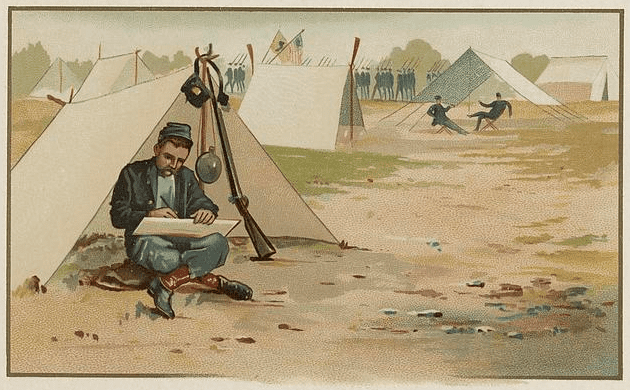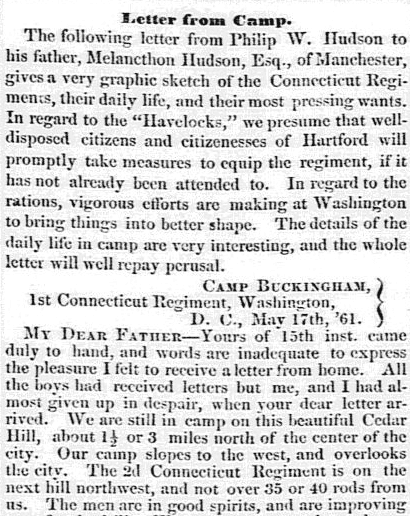After the Civil War began with the Confederacy firing on Fort Sumter on 12 April 1861, the North responded enthusiastically to President Lincoln’s call for 75,000 volunteers to serve for 90 days. The Union mobilized for the war effort, supplying men, arms and equipment, forming a Northern army to suppress the Southern rebellion. Then the monumental task began of converting these raw recruits into an organized, effective fighting force.
Regiment after regiment was divided into camps and the men drilled incessantly to prepare for the ordeal of battle. The daily camp routine was described in the following letter a Connecticut soldier, Philip W. Hudson, wrote to his father on 17 May 1861.

While the Northern public and press grew impatient and demanded the army take action, the drilling of the soldiers went on, day after day. This careful preparation proved inadequate, however, when the Union army was routed by Confederate forces at the first major military engagement of the Civil War: the First Battle of Bull Run (Manassas) on 21 July 1861. In his official report the Union’s commanding officer, General Irvin McDowell, lamented the lack of discipline shown by his troops. Perhaps the soldiers should have been drilled even more.
This Connecticut soldier’s letter describes daily life in a Civil War camp prior to that first big battle. While government records give us our ancestors’ vital statistics, it is content like this – letters and stories published in old newspapers – that tells us what our ancestors were like, and provides details of the life they led.

Here is a transcript of this article:
Letter from Camp
The following letter from Philip W. Hudson to his father, Melancthon Hudson, Esq., of Manchester, gives a very graphic sketch of the Connecticut Regiments, their daily life, and their most pressing wants. In regard to the “Havelocks,” we presume that well-disposed citizens and citizenesses of Hartford will promptly take measures to equip the regiment, if it has not already been attended to. In regard to the rations, vigorous efforts are making at Washington to bring things into better shape. The details of the daily life in camp are very interesting, and the whole letter will well repay perusal.
Camp Buckingham,
1st Connecticut Regiment, Washington, D.C.
May 17th, ’61.
My Dear Father:
Yours of 15th inst. came duly to hand, and words are inadequate to express the pleasure I felt to receive a letter from home. All the boys had received letters but me, and I had almost given up in despair, when your dear letter arrived. We are still in camp on this beautiful Cedar Hill, about 1½ or 3 miles north of the center of the city. Our camp slopes to the west, and overlooks the city. The 2d Connecticut Regiment is on the next hill northwest, and not over 35 or 40 rods from us. The men are in good spirits, and are improving very fast in drill. We are kept very strict and constantly drilling. I will give you an account of our daily duties.
Reveille and roll call at 4:45 A.M.; 1st drill from 5½ to 7 A.M., when we have (what we can get) breakfast. Surgeon’s call at 8 o’clock, when all those unwell who can walk call at the surgeon’s tent for medicine, advice, &c.; at 9 o’clock A.M., guard mounting, when a new officer of the day, officer of the guard, sergeants and corporals of the guard, and seven men from each company, are detailed to guard the camp for the next 24 hours, and relieve the guard that is on. The guard mounting is conducted with much ceremony. The new guard are drawn up in double ranks, and while the band plays some lively air the officer of the guard inspects the arms. After that is over, the guard breaks into platoons and march in review before the officer of the day and the officer of the old guard; they are marched under command of the Adjutant and Sergeant Major; the old guard is then dismissed and each company’s squad is marched back to its company street by its own orderly sergeant.
The 2d drill is from 9½ to 11½ A.M., when we are dismissed for dinner; 3d drill, from 1 to 3 P.M.; 4th drill, from 4½ to 5½ P.M.; dress parade at 6½ P.M., which is very fine and improving daily. It is witnessed by many ladies and gentlemen from the city, who praise the Regiment highly. People say in the city that we are altogether the best and most fit for active service of any regiment here.
Tattoo and roll call at 9½ P.M.; 15 minutes later there are three taps of the drum, when every light in the men’s tents must be out.
The men seem to enjoy their life very much, only they have such poor rations. We have been obliged to go without some meals on account of their being so bad. Whose fault it is, I am unable to say – some blame one and some another. I have not eaten a ration since we have been in camp. I buy all I have (as do most of the Regiment) of negroes, (some free and some slave) who bring into camp morning and evening, nice new milk, hominy, corn cakes, pies, hot rolls, broiled shad, and all sorts of cakes. They are very reasonable in their prices, and as long as our money lasts we shall live well, and no thanks to government officers.
There are four companies of U.S. cavalry close by us who have lately come from Texas. It is very amusing to see their new recruits learn to ride. They have some very fine horses, but most too large for very active service. One of their officers told me that they would not last them a month on the Texas frontier; they are Ohio horses.
The sun is very hot during the day. Most of the men drill without their coats. The evenings are very chilly, and towards morning we are mighty glad to pull on any spare blankets, coats, &c., to keep us warm, and can hardly do so then. We have slept on the bare ground until last night, when each two men had a tick and some straw given them to sleep on, which made it a little more comfortable.
Our regiment suffer very much by having their ears and necks burned by the sun. I don’t see why some patriotic citizens of Connecticut don’t furnish their 1st Regiment with linen or woolen cap covers like those furnished to the 2d. Most of the regiment cannot afford to pay 35 or 40 cents for one here; they really need them. I wish you would see some of the right kind of men in Hartford, and see if we can’t have some sent us. We ought to have them right away, as the sun grows every day hotter.
A sergeant and nine men are allowed to go to the city every day to see the sights. They bring up everything in the shape of relics to send home. The Rhode Island Regiment have nearly stripped the tree that the balls that killed Philip Barton Key went into, but have been unable to find any of the balls; they send home the bark as relics. I went yesterday all over the White House gardens and conservatories. They are very fine; but one thing spoiled the effect, and that was the nasty, muddy water from the Potomac with which the fountains were supplied.
The streets are full of soldiers in all kinds of uniforms; it makes a very fine appearance. It is a pleasant sight to see our regiment between drills scattered about under the trees, some reading letters from home, others in groups listening to someone who is reading the latest news from the morning papers; here and there one or two writing on their knapsacks to dear ones at home; in another place you will see four or five smoking and having a game of whist or euchre. Take them all together they are as happy a set as you would wish to see. We hear every day that we are to be ordered to one place and another, but have got so now that we do not believe anything we hear or read. All we believe is what we see and what our officers tell us.
One or two of our company are sick with the fever and ague, but are now better. One of them has a very bad sprained ankle. One of the Hartford Rifles had one of his fingers blown off by one of Sharps’ pistols. I saw the surgeon cut off the part that was left.
I will now bid you goodbye, as it is most time for drill. I will write again in a few days. Write often and send me the daily papers. With much love to all,
I remain your affectionate son,
P. W. Hudson
Note: An online collection of newspapers, such as GenealogyBank’s Historical Newspaper Archives, is not only a great way to learn about the lives of your ancestors – the old newspaper articles also help you understand American history and the times your ancestors lived in, and the news they talked about and read in their local papers. Did any of your ancestors serve in the Civil War? Please share your stories with us in the comments.
Related Civil War Articles:
